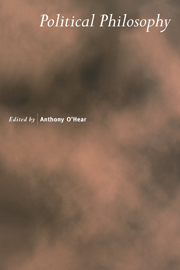Book contents
- Frontmatter
- Contents
- Preface
- Notes on Contributors
- Making the World Safe for Utilitarianism
- Innocent Before God: Politics, Morality and the Case of Billy Budd
- Democracy and Openness
- Rights and Human Rights
- Prerogative to Depart from Equality
- Casting the First Stone: Who Can, and Who Can't, Condemn the Terrorists?
- Against Egalitarianism
- Big Decision: Opting, Converting, Drifing
- The Epistemology of Unjust War
- High Culture, Low Politics
- Edmund Burke and the Anglo-American Tradition of Liberty
- The Politics of Emotion: Liberalism and Cognitivism
- Index of Names
The Epistemology of Unjust War
Published online by Cambridge University Press: 04 August 2010
- Frontmatter
- Contents
- Preface
- Notes on Contributors
- Making the World Safe for Utilitarianism
- Innocent Before God: Politics, Morality and the Case of Billy Budd
- Democracy and Openness
- Rights and Human Rights
- Prerogative to Depart from Equality
- Casting the First Stone: Who Can, and Who Can't, Condemn the Terrorists?
- Against Egalitarianism
- Big Decision: Opting, Converting, Drifing
- The Epistemology of Unjust War
- High Culture, Low Politics
- Edmund Burke and the Anglo-American Tradition of Liberty
- The Politics of Emotion: Liberalism and Cognitivism
- Index of Names
Summary
My friend Steven Wagner, a philosopher I very much admire, recently wrote me that he finds ‘Just War Theory’ in its present form wholly untenable. With his permission, I shall quote part of what he wrote:
Here's what I meant about just war theory (JWT) and ontology. The formulations of JWT effectively identify three distinct objects: a population, a nation, and the high-level decisionmakers in the government. Therefore, even if JWT is invoked in the cause of peace, it surrenders the larger battle by buying into an authoritarian political ontology. So it's an irremediably spoiled tool for justice.
A philosopher can easily work out epistemological costs of this ontological sin. Here, though, is a cost that is related to but does not immediately come out of the pernicious ontology.
JWT imposes requirements of justified belief: regarding the outcomes of alternative courses of military in/action. Applying elementary considerations about evidence, we argue that the relevant beliefs can be justified only if their source is a professional agency strictly independent of the decision-making sector and disinterested relative to the outcomes.
These clauses need more careful formulation. E.g., ‘professional’ will imply membership standards no less rigorous (and applicable to the subject matter) than those governing, say, physicians and philosophy professors. ‘Disinterested’ must mean at least ‘no more interested than is the population in general’.E.g., if the professionals stand to gain from a war, then no more so than the run of the people. […]
- Type
- Chapter
- Information
- Political Philosophy , pp. 173 - 188Publisher: Cambridge University PressPrint publication year: 2007
- 1
- Cited by



